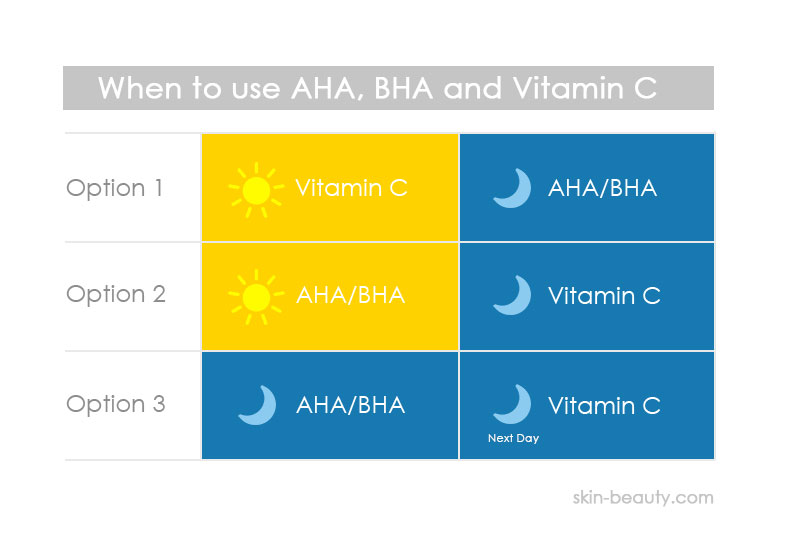Can Vitamin C Be Used With Lactic Acid
If you're seeking a brighter, more even skin tone (aren't we all?), then two of the best ingredients to try are acids (AHA or BHA) and vitamin C. Read along to find out the beauty benefits of AHAs, BHAs and Vitamin C with a bonus at the end for some of the best AHA/BHA products for your skin!

AHA vs BHA: What are AHA and BHA?
Acids are great because they exfoliate away dull, dead skin and gently remove discolorations with time. AHAs (alpha-hydroxy acids) target the face layers of the epidermis, whereas BHAs (beta-hydroxy acids) unclog pores. Then there's vitamin C, a strong antioxidant that boosts radiance and helps fade sun harm.
You are able to use every one on its own, but should you want to really take your advantages to another degree? Consider including both on your routine! You may be a little unsure of how to go about layering these active substances.
"Do they've to be used at different times? Can one inactivate the other? Can you layer AHA and Vitamin C? Which one goes on first? What about wait times? Can you use Vitamin C in the morning and AHA at night? "
We've got the answers! Read on to know:
- The rationale for using AHAs BHAs and Vitamin C separately
- How to use AHA and BHA together with Vitamin C
- How layering them together might in fact give you better results
- How long to wait between layers
How to use AHA and BHA with Vitamin C for best results
Option 1: Using AHAs, BHAs and Vitamin C at Different Times
Image Skincare advises against using acids with vitamin C together. In case your skin is dry or very very sensitive, consider using vitamins as well as vitamin C at different times of day. Why? Considering that AHA BHA and Vitamin C are acidic ingredients, so there's more chance of exacerbating those conditions and irritating your skin.
When to use AHA and BHA and Vitamin C? Here's what you could do:
- Vitamin C in the morning and an AHA or BHA during the evening
- AHA or BHA in the morning, and vitamin C during the night (bearing in mind that AHAs make skin more sun-sensitive)
- AHA or BHA one night, vitamin C the next

As Peter Thomas Roth advises on Camu Camu Power C30 Vitamin C Brightening Moisturizer packaging:
"Don't use with exfoliating/filling high-concentrate vitamin C or A products, or other products with BHA and AHA. If you want faster effect, we advise that you use one in mornings along with other in evenings, or use them one at a time on each individual moment."
But let's break this down a bit more. They do have a point with regards to vitamin A, about how acids may impair retinol conversion. So do acids have to be separated from vitamin C to the exact same reason? Not always! In reality, AHA, BHA and Vitamin C can be VERY compatible.
Option 2: Layering Vitamin C + AHA/BHA Together
Acids can enhance the potency of vitamin C. If your skin can tolerate them, it's possible to use acids at the exact same time as vitamin C. That "acids destabilize vitamin C" appears to be one of these things that is repeated all the time, but is not precisely true. I've not found any evidence that layering two pH-compatible products would render either one unsuccessful--in actuality, quite the opposite!
Employing an acid right before your vitamin C could actually ENHANCE your results. Here is why:
Antioxidants help prep the skin to get much better absorption of active ingredients, such as vitamin C. By removing barrier-forming dead cells, you increase the rate of penetration. AHAs and BHAs make the skin more acidic (they lower pH). According to studies, the active form of vitamin C, L-ascorbic acid, has been found to soak up best at a very low pH. Put simply, an acid may create the perfect conditions for the vitamin C to be effective. The catch? You have to be familiarized with the pH of your products!
How to layer AHA and Vitamin C? AHAs, BHAs, or Vitamin C, which one should I apply first?
The same as products should always be applied in order of thinnest to thickest, you also want to move from the direction of smallest to highest pH. Which means your most acidic merchandise should go on first. Typically, but not necessarily, it is going to be your AHA or BHA. (If, for some reason, you wanted to use both an AHA and a BHA at the exact same time, the BHA goes on first because it's oil-soluble). Then would come your vitamin C. The exception is when your acid has a thicker texture (like a cream), or if your vitamin C has a reduced pH. In that case, put on the C first, then add your acid. If you are using moisturizer, use the the acid first then moisturizer last (preferably wait 30 minutes later). To get the most benefits of the moisturizer products, apply with Jade Face Roller to boosts collagen production and elastin while promoting lymphatic drainage to detox your skin.

How long should I wait between layers?
In case your vitamin C is not pH-dependent.
Apply it once the acid has been absorbed since they don't need a certain pH to be effective.
In case your acid and vitamin C are close in pH.
When you've two products with comparable pH levels (say, within 1.0 of each other), I think you can go ahead and use them at the exact same time without waiting. It's because they've been formulated to maintain their efficacy in the exact same level of acidity. Therefore, you may apply your second layer once the first one has absorbed and your skin is dry to touch.
In case your acid and vitamin C aren't close in pH.
If there's a bigger gap between the pH levels--let us say, a difference of more than 1.0 or 2.0--I would probably incorporate a little waiting time (up to half an hour) to allow every item to work in its best pH range.
Again, if you can not be bothered worrying about the entire pH business, feel free to simplify your daily life and use these ingredients at different times of day!
Conclusion
You now know the key to integrating both acids and vitamin C on your routine. To prevent wait times, choose products which are close in pH or not pH-dependent. If you're tight on time, I think the simplest solution is to choose two products which are close in pH, or a vitamin C that is not pH-dependent in any way. This way, you may employ them right on top of each other with complete peace of mind. That the acid will make the vitamin C work even more difficult is a bonus!
Bonus: Best AHA/BHA skincare product
AHA BHA Exfoliating Cleanser Murad combines three intensive exfoliating agents - Salicylic Acid, Glycolic, and Lactic Acid Acid polish away dull, dry skin to reveals smoother texture and a brighter, younger-looking complexion. Jojoba beads clean away roughness and dryness while sodium PCA attracts water to the skin to help it maintains elasticity and plumpness to function as a strong, healthy barrier.
AHA/BHA Exfoliating Cleanser SkinMedica is the perfect facial cleanser that removes dead cells and other impurities from your skin, reduces fine lines and illuminates your complexion. The gentle yet active formula removes impurities, excess oils and makeup as it hydrates and purifies pores while encouraging healthy skin renewal without leaving skin feeling dry, tight or irritated.
Glymed Plus AHA Accelerator is a lightweight serum that work with the skin's natural immune system. Made with 20% Alpha and Beta hydroxys, this accelerator helps cell renewal and reduce the signs of aging caused by stress and lifestyle imbalance.
Oct 22nd 2020
Can Vitamin C Be Used With Lactic Acid
Source: https://www.skin-beauty.com/the-way-to-use-ahas-bhas-and-vitamin-c-in-a-skincare-routine.html








Tidak ada komentar:
Posting Komentar